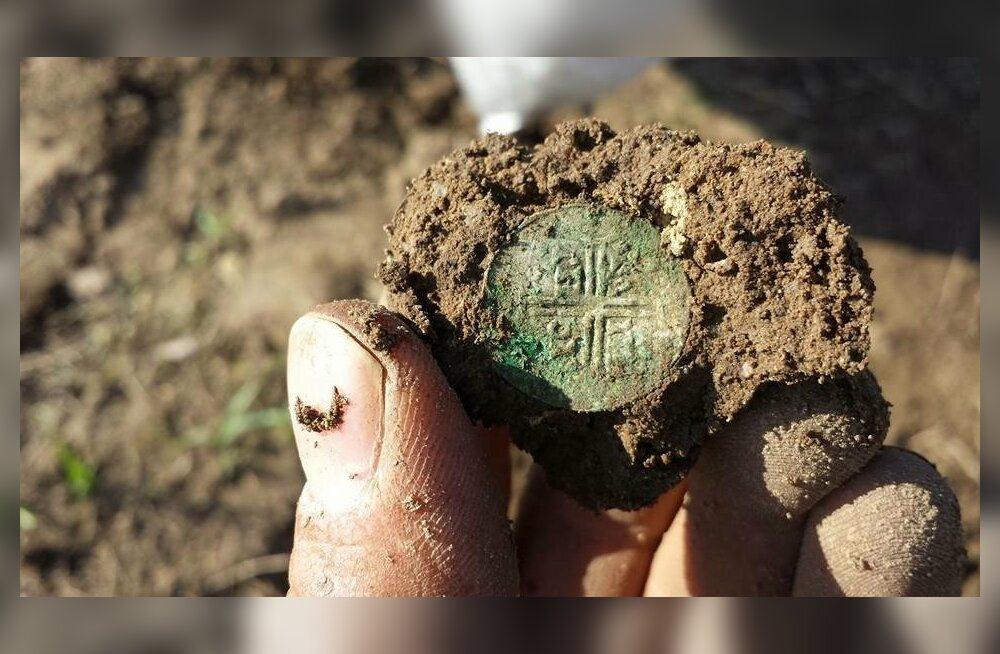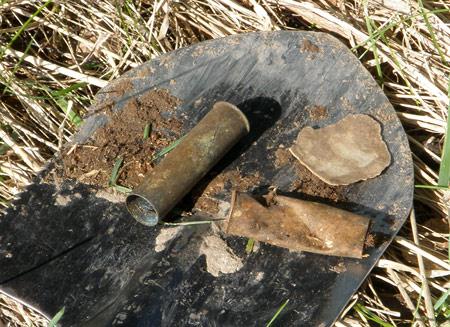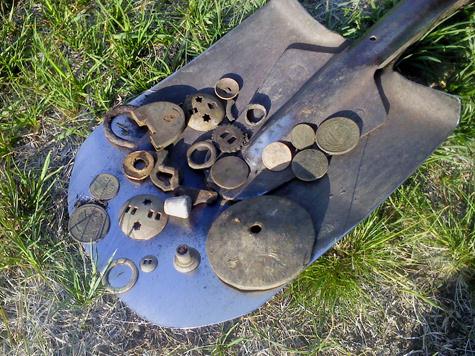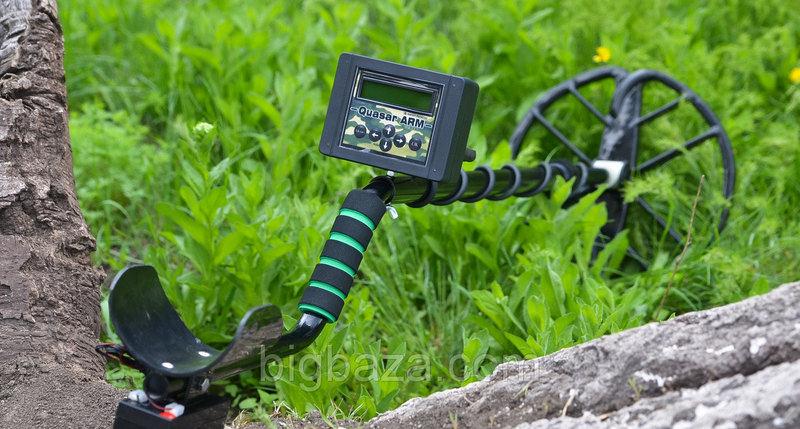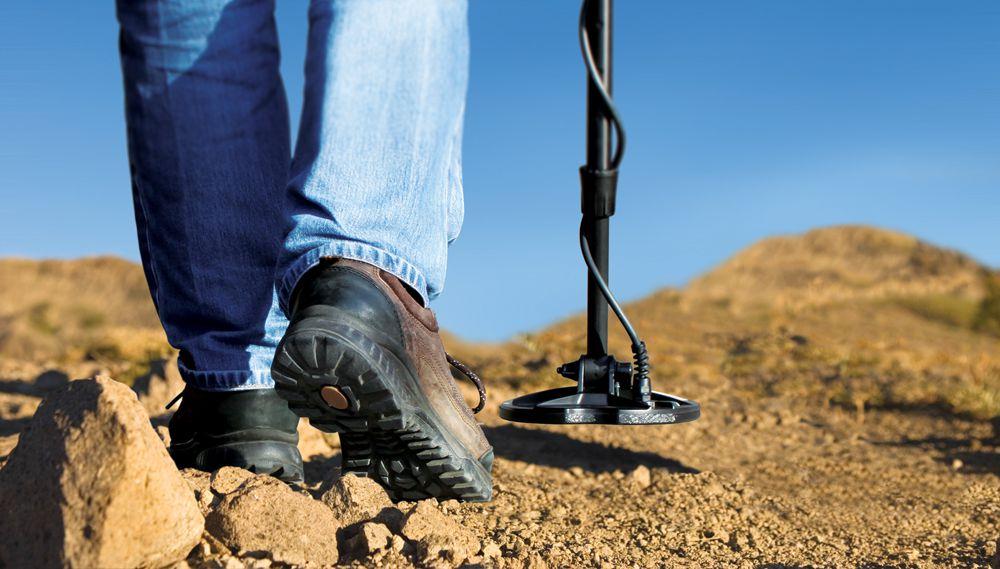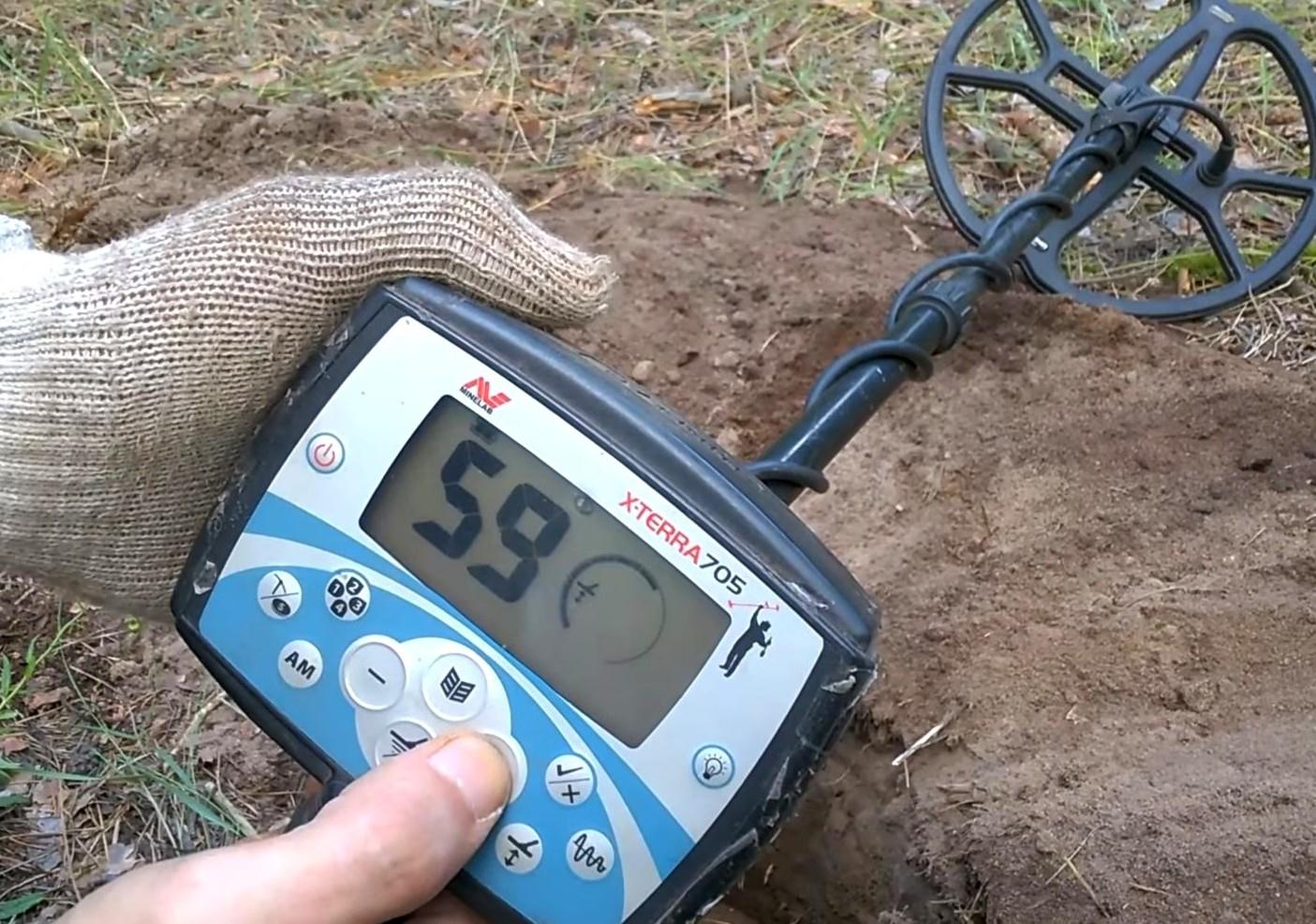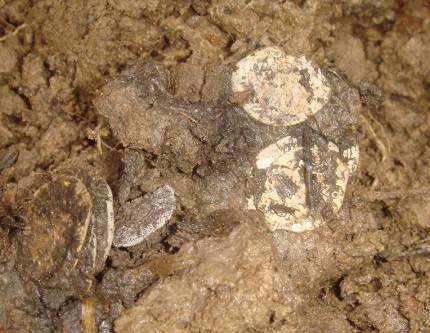Estonia is a suitable country to search for treasures. Who was not here - at different times the country was visited by Swedes, Danes, and Russians. Not to mention the extensive trade - Tallinn has long been considered an important trading city, and from the capital valuable overseas goods and money were sent further. Something settled in the outback, and in the truest sense of the word - coins could easily roll out and get lost in roadside mud. And now, for example, searchers from time to time raise even Arab dirhams to the surface, MK-Estonia writes.
Everything can become a treasure - for example, the crocks of a ceramic bowl, 400 years ago did not present any value for the medieval housewife, now suddenly become unique artifacts, witnesses of bygone times. Jewelry, which has long worn in the grave beauty, going to the feasts, become unique archaeological finds, which are exhibited in the museum, on the stand with alarm.
Often (if in the concept of treasure hunting you can use this word) find treasures of the Viking times. As amateur seeker Pavel Malm explains, the Vikings did these treasures not to hide money and return later, but as a sacrifice to appease the gods.
Well, any little-wealthy peasant considered it a holy duty to collect money in a cube and hide it near the house - for a rainy day. By the way, many such caches are found just near old houses. Sometimes they discover things of several eras.
"It's not surprising," says amateur finder Pavel Malm. "Often people have lived in the same place for generations, so it is quite natural to find things of different periods in these territories."
Regularly single coins, and even whole collections are found on old fields and roads - in the field accidentally could roll away, on the road worked the old rule: that from the cart fell, then disappeared. And now sometimes we come across.
Everything can become a treasure - for example, the crocks of a ceramic bowl, 400 years ago did not present any value for the medieval housewife, now suddenly become unique artifacts, witnesses of bygone times. Jewelry, which has long worn in the grave beauty, going to the feasts, become unique archaeological finds, which are exhibited in the museum, on the stand with alarm.
Often (if in the concept of treasure hunting you can use this word) find treasures of the Viking times. As amateur seeker Pavel Malm explains, the Vikings did these treasures not to hide money and return later, but as a sacrifice to appease the gods.
Well, any little-wealthy peasant considered it a holy duty to collect money in a cube and hide it near the house - for a rainy day. By the way, many such caches are found just near old houses. Sometimes they discover things of several eras.
"It's not surprising," says amateur finder Pavel Malm. "Often people have lived in the same place for generations, so it is quite natural to find things of different periods in these territories."
Regularly single coins, and even whole collections are found on old fields and roads - in the field accidentally could roll away, on the road worked the old rule: that from the cart fell, then disappeared. And now sometimes we come across.
Metal detector and shovel.
Everyone can go in search of treasure. However, not everyone is lucky. Fortune is a capricious lady, and before you start searching, you need to know exactly where to look. If you are not a professional, it is better to take special courses - the pros will tell a lot of interesting things, including where and how we can look - just so with a metal detector in search of treasure is forbidden to go. Although it is not prohibited to be used in work tasks - often it is worked with, for example, police or deminers.
"The courses address quite a wide range of issues," says Dmitry Shutov, a board member of the Camerad Search and Local Club. "Including a serious question about determining the cultural value of the find. For example, such a find may be not only a material object of material value, but also fragments of ceramics, indicating a possible settlement of the Stone Age and requiring further research, as well as the place of discovery. An important concept is the cultural layer as a whole. After all, a single object extracted from the cultural layer can make it impossible to date the remaining items in this layer. It's all very difficult and requires skills."
Nele Kangert, Chief Inspector of the Department of Antiquities' Archaeology Department, notes that in order to find cultural property with a metal detector, in addition to the need to take a course, you also need permission from their department.
"The search permit is valid for one year, and then the owner must provide us with a report," Explains Kangert. "Based on these reports, we either renew the permit or we don't. In addition, if a search is planned on a private property, the owner's permission is required."
As for the search with a metal detector, there are difficulties. The law clearly stipulates that only a certified person can use it in the search for archaeological treasures. But sometimes unique finds are made by those who did not pursue the goal of finding something rare - to search for other items the use of the detector is not prohibited.
"This is a controversial point that has not yet been resolved," Shutov said. "But in any case, there is an important addition to all of the above: a person who has decided to search for antiquities should not have existing punishments for violating the Antiquities Protection Act."
If in some place you are lucky, and you found not a single shard or coins, and a whole treasure - with a bunch of coins, jewelry, jewelry and other - you will need to go through a special procedure of registration (about this a little below). But, in addition, the site of the find will be mapped - put on a special map of the protected areas of the country (not to be confused with reserves, here we are talking about cultural property and archaeological finds), and, most likely, if it is really serious find, access to this territory for amateurs will be blocked.
"The courses address quite a wide range of issues," says Dmitry Shutov, a board member of the Camerad Search and Local Club. "Including a serious question about determining the cultural value of the find. For example, such a find may be not only a material object of material value, but also fragments of ceramics, indicating a possible settlement of the Stone Age and requiring further research, as well as the place of discovery. An important concept is the cultural layer as a whole. After all, a single object extracted from the cultural layer can make it impossible to date the remaining items in this layer. It's all very difficult and requires skills."
Nele Kangert, Chief Inspector of the Department of Antiquities' Archaeology Department, notes that in order to find cultural property with a metal detector, in addition to the need to take a course, you also need permission from their department.
"The search permit is valid for one year, and then the owner must provide us with a report," Explains Kangert. "Based on these reports, we either renew the permit or we don't. In addition, if a search is planned on a private property, the owner's permission is required."
As for the search with a metal detector, there are difficulties. The law clearly stipulates that only a certified person can use it in the search for archaeological treasures. But sometimes unique finds are made by those who did not pursue the goal of finding something rare - to search for other items the use of the detector is not prohibited.
"This is a controversial point that has not yet been resolved," Shutov said. "But in any case, there is an important addition to all of the above: a person who has decided to search for antiquities should not have existing punishments for violating the Antiquities Protection Act."
Guess three times
If in some place you are lucky, and you found not a single shard or coins, and a whole treasure - with a bunch of coins, jewelry, jewelry and other - you will need to go through a special procedure of registration (about this a little below). But, in addition, the site of the find will be mapped - put on a special map of the protected areas of the country (not to be confused with reserves, here we are talking about cultural property and archaeological finds), and, most likely, if it is really serious find, access to this territory for amateurs will be blocked.
Every year there are more and more such places. But there are still opportunities to search - and they are found. In April this year, members of the Camerad Club discovered 51 coins dating back to the Roman period and the late Iron Age in the Simer district of Liane Virumaa. According to experts, this is the largest treasure trove of coins discovered in Estonia of this era.
But it is extremely difficult for fans to determine the value of the find - for example, if we are talking about single coins, they are sometimes covered with dirt and erased so that the layman, most likely, will take it for an incomprehensible piece of the unknown of what and throw away for lack of need. Whereas a true collector wouldn't pass by.
But if you are lucky and you came across a real treasure, do not try to extract it yourself.
"Such finds automatically become state property," says Nele Kangert of the Department of Antiquities. "And you should report them immediately. Moreover, the place of the find in any case can not be excavated further, so as not to damage the cultural layer - wait for the experts. The found will be evaluated by experts who will determine its future fate."
However, most of the finds are returned to the seekers - after a number of studies it becomes clear that there is no sense to keep them for future generations. So sometimes it's easy to take a picture of an object and document a find. But you need to know exactly what you found. Therefore, it is better for a layman to consult with scientists just in case.
Valued everything that belongs to the Middle Ages and older - such finds should be handed over to the state.
But it is extremely difficult for fans to determine the value of the find - for example, if we are talking about single coins, they are sometimes covered with dirt and erased so that the layman, most likely, will take it for an incomprehensible piece of the unknown of what and throw away for lack of need. Whereas a true collector wouldn't pass by.
But if you are lucky and you came across a real treasure, do not try to extract it yourself.
"Such finds automatically become state property," says Nele Kangert of the Department of Antiquities. "And you should report them immediately. Moreover, the place of the find in any case can not be excavated further, so as not to damage the cultural layer - wait for the experts. The found will be evaluated by experts who will determine its future fate."
However, most of the finds are returned to the seekers - after a number of studies it becomes clear that there is no sense to keep them for future generations. So sometimes it's easy to take a picture of an object and document a find. But you need to know exactly what you found. Therefore, it is better for a layman to consult with scientists just in case.
Valued everything that belongs to the Middle Ages and older - such finds should be handed over to the state.
"No one is surprised by the coins of the tsarist time," says amateur seeker Pavel Malm. "But, for example, if you come across items or money from the Viking era or, for example, Arab dirhams (and this also happens), you are obliged to hand over the find to the state. Experts will evaluate the items, assign a prize. The fact that the state will not be evaluated, can always be sold or exchanged at special auctions - there are a lot of sites where thousands of collectors gather."
Money-money-money
Well, we'll go back to the hoards. More precisely, to one of the most pleasant moments - reward. Here you have found the treasure, the state has appreciated the efforts and is preparing to hand over the prize - in the case of a really valuable find, the finder is entitled to a reward.
"There's no fixed rate," says a specialist in the Department of Antiquities. - It all depends on a number of factors: whether there was permission to search the person, how he conducted excavations, when he informed, what is the value of the find, etc. Then the experts give an expert assessment and the payment is assigned. Last year, the state allocated 100,000 euros for the prize."
By the way, the reward is not always. So, for example, if you find something in the already mapped area, there will be no premium. (It is worth noting that in protected areas any search, even if all permits are available, is prohibited.)
However, sometimes it does not stop, because in addition to certified search engines there are also "black diggers." They illegally go in search of prey and about their findings loudly do not shout, trying to sell found on the black market. This topic is quite slippery.
"It is worth understanding that having discovered and concealed a find of cultural value, the find puts itself at great risk," says Dmitry Shutov of the Camerad Regional Club. "Findings and information must fall into the hands of scientists to make interaction sway and our shared history to find new and interesting pages."
But sometimes money will freeze everything, so things happen.
"Sometimes people with metal detectors find different things without even pursuing the goal of finding something valuable," says Nele Kangert. "Our experts are weighing all the circumstances under which the find was made. The main thing - tell us about it, because things can be really unique! The worst thing is when it's all done in secret and sent to the black market. If we fix this, criminal proceedings begin. If you use a metal detector to search for culturally valuable items, a fine is possible."
However, it happens that the treasure hunter become involuntarily - on the beach often lost rings, chains, then keys. In search sifted more than one kilogram of sand, sometimes the seekers are lucky, and the missing is. And sometimes others find others missing - by accident.
And here comes a moment of legal nuance. The fact is that the concepts of find and treasure are very different.
"The treasure is considered to be buried in the ground or otherwise concealed money or valuable items, such as gems, pearls or precious metals, the owner of which cannot be established," Danil Lipatov, a lawyer at progressor's office, was quoted as saying by law.
But the find is considered just that sometimes you can accidentally shave out on the beach - some chains, watches, keys and so on.
Money-money-money
Well, we'll go back to the hoards. More precisely, to one of the most pleasant moments - reward. Here you have found the treasure, the state has appreciated the efforts and is preparing to hand over the prize - in the case of a really valuable find, the finder is entitled to a reward.
"There's no fixed rate," says a specialist in the Department of Antiquities. - It all depends on a number of factors: whether there was permission to search the person, how he conducted excavations, when he informed, what is the value of the find, etc. Then the experts give an expert assessment and the payment is assigned. Last year, the state allocated 100,000 euros for the prize."
By the way, the reward is not always. So, for example, if you find something in the already mapped area, there will be no premium. (It is worth noting that in protected areas any search, even if all permits are available, is prohibited.)
However, sometimes it does not stop, because in addition to certified search engines there are also "black diggers." They illegally go in search of prey and about their findings loudly do not shout, trying to sell found on the black market. This topic is quite slippery.
"It is worth understanding that having discovered and concealed a find of cultural value, the find puts itself at great risk," says Dmitry Shutov of the Camerad Regional Club. "Findings and information must fall into the hands of scientists to make interaction sway and our shared history to find new and interesting pages."
But sometimes money will freeze everything, so things happen.
"Sometimes people with metal detectors find different things without even pursuing the goal of finding something valuable," says Nele Kangert. "Our experts are weighing all the circumstances under which the find was made. The main thing - tell us about it, because things can be really unique! The worst thing is when it's all done in secret and sent to the black market. If we fix this, criminal proceedings begin. If you use a metal detector to search for culturally valuable items, a fine is possible."
Gold, diamonds
However, it happens that the treasure hunter become involuntarily - on the beach often lost rings, chains, then keys. In search sifted more than one kilogram of sand, sometimes the seekers are lucky, and the missing is. And sometimes others find others missing - by accident.
And here comes a moment of legal nuance. The fact is that the concepts of find and treasure are very different.
"The treasure is considered to be buried in the ground or otherwise concealed money or valuable items, such as gems, pearls or precious metals, the owner of which cannot be established," Danil Lipatov, a lawyer at progressor's office, was quoted as saying by law.
But the find is considered just that sometimes you can accidentally shave out on the beach - some chains, watches, keys and so on.
What can be found with a metal detector?
best reviews metal detectors for gold
The man with the metal detector: the finds will
be enough for hundreds of years
What to find with a metal detector
Metal detector with your own hands. Detailed instructions with diagrams
Powerful Pirat metal detector with his own hands
best reviews metal detectors for gold
The man with the metal detector: the finds will
be enough for hundreds of years
What to find with a metal detector
Metal detector with your own hands. Detailed instructions with diagrams
Powerful Pirat metal detector with his own hands
Comments & Responses
Leave a Reply
Your email address will not be published. Required fields are marked *
Comment
Leave a Reply
Your email address will not be published. Required fields are marked *
Comment
Name *
Email *
Website
The man with the metal detector: the finds will be enough for hundreds of years
What to find with a metal detector
Metal detector with your own hands. Detailed instructions with diagrams
Powerful Pirat metal detector with his own hands
Metal detector BU how to check
Search for gold with a metal detector
If the police came to your cop. What to do?
Metal detectors
What is a metal detector and how it works
How the metal detector works and more for beginners
What is a metal detector and how does it work?
How manual and arched metal detector works
Best metal detector for gold
Iskateli Collectors Store Chain
Choosing a metal detector to find gold
Tune Minelab X-Terra 705
How to set up a Garrett AT Pro metal detector
What can be found with a metal detector?
What can be found with a ground metal detector
Options for balancing the ground of metal detectors
What benefits can be brought to treasure hunters of downpours
What can you find with a metal detector?
How to use a metal detector and what to find
What can i find with a metal detector?
Looking for a treasure without a metal detector
Finds that can be made with a metal detector
Is it possible to find a treasure in Estonia and what to do if something valuable has fallen into your hands?
Named places where in the suburbs with a high probability you can find a treasure
What and where can be found with a metal detector?
Homemade metal detectors, or how to make a metal detector with your own hands
Search for hoards with a metal detector, the 2015 season is not closed yet
What is a metal detector and why it is needed
Improvised coil for pulsed metal detector
Search for metal detector-free coins
Where to look for coins metal detector
Instructions for the Garrett Ace 250 metal detector
What is a metal detector
What to find with a metal detector
Metal detector with your own hands. Detailed instructions with diagrams
Powerful Pirat metal detector with his own hands
Metal detector BU how to check
Search for gold with a metal detector
If the police came to your cop. What to do?
Metal detectors
What is a metal detector and how it works
How the metal detector works and more for beginners
What is a metal detector and how does it work?
How manual and arched metal detector works
Best metal detector for gold
Iskateli Collectors Store Chain
Choosing a metal detector to find gold
Tune Minelab X-Terra 705
How to set up a Garrett AT Pro metal detector
What can be found with a metal detector?
What can be found with a ground metal detector
Options for balancing the ground of metal detectors
What benefits can be brought to treasure hunters of downpours
What can you find with a metal detector?
How to use a metal detector and what to find
What can i find with a metal detector?
Looking for a treasure without a metal detector
Finds that can be made with a metal detector
Is it possible to find a treasure in Estonia and what to do if something valuable has fallen into your hands?
Named places where in the suburbs with a high probability you can find a treasure
What and where can be found with a metal detector?
Homemade metal detectors, or how to make a metal detector with your own hands
Search for hoards with a metal detector, the 2015 season is not closed yet
What is a metal detector and why it is needed
Improvised coil for pulsed metal detector
Search for metal detector-free coins
Where to look for coins metal detector
Instructions for the Garrett Ace 250 metal detector
What is a metal detector
